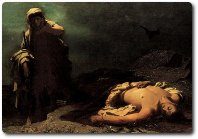Articles
- Impact of classical literature
- The cultural influence of classical ideas
- Literary allusions to classical literature
Afterlife
Worlds apart
People in ancient Greece had a range of different views on what death meant:
- The stoics, for example, believed that life ended in oblivion or nothingness
- The mythological tradition was inconsistent: In some stories the dead went off to live in the Hesperides or ‘Isles of the Blessed' beyond the western horizon.
More on the Hesperides: As far as the ancient Greeks were concerned, the world ended at the Straits of Gibraltar. The apparently infinite waters of the Atlantic Ocean belonged to another dimension of experience. The idea of the ‘Hesperides', however, seems to have been rooted in what they had heard from local people about the existence of a real offshore island-group, the Canaries!
- Alternatively there was Hades, a dank and dark world beneath the earth, beyond the River Styx, across which the departed soul would be ferried by the boatman, Charon.
- Another myth describes the fate of the twins, Castor and Pollux, metamorphosed into two stars to spend eternity together.
Reincarnation
The story of Castor and Pollux might be dismissed as no more than a  sentimental story. However, there was a more widespread feeling that the dead might endure in different forms, which can be seen from the doctrines put forward by Pythagoras in the sixth century BCE. He was a firm believer in the ‘transmigration of souls': the dead came back, he argued, in other human, animal – or even vegetable – form.
sentimental story. However, there was a more widespread feeling that the dead might endure in different forms, which can be seen from the doctrines put forward by Pythagoras in the sixth century BCE. He was a firm believer in the ‘transmigration of souls': the dead came back, he argued, in other human, animal – or even vegetable – form.
Reward and punishment
The idea that the good might be rewarded in the afterlife is present in the notion of the ‘Isles of the Blessed'. The Greeks also had stories of hellish punishments as well. In a deep and gloomy pit called Tartarus, extending down far below even the underworld of Hades, certain sinners were singled out for terrible tortures:
- Ixion was condemned to spend the rest of time spinning on a giant and fiery wheel
- Tantalus was condemned to be ‘tantalized' through an eternity of hunger and thirst:
- Just out of reach hung apples on a bough which withdrew from his hand as he reached out
- At his feet was a pool whose waters receded as he tried to drink
- Sisyphus was condemned to roll a boulder up a slope; just as he neared the top, it would roll down and he would have to start again.
Inconsistent 'justice'
To modern eyes there is an air of bleak comedy about the punishments of Tartarus. The ancient myths give no sense that such punishments were handed out systematically. Ordinary Greeks and Romans do not appear to have feared that they would go to hell as later Christian believers might have done: the afterlife seems to have been equally dismal for everybody, good or bad, an endlessly dreary existence of cold and darkness without relief.
Ghosts
The only thing worse than an eternity in the underworld was an eternity above ground as a ghost. Those who did not receive a fitting burial with the right ritual observances afterwards would not be admitted to the underworld and would be forced to wander the world in phantom form. It  was this belief which motivated Antigone to defy the edict of her uncle, King Creon, and bury her disgraced brother, Polynices. The Greeks and Romans were so frightened of this fate that those who had no children to see to their burial rites would often adopt them simply to be sure of being properly laid to rest when the moment came.
was this belief which motivated Antigone to defy the edict of her uncle, King Creon, and bury her disgraced brother, Polynices. The Greeks and Romans were so frightened of this fate that those who had no children to see to their burial rites would often adopt them simply to be sure of being properly laid to rest when the moment came.
Death and judgement
The western European tradition of the Christian Heaven and Hell developed from Judeo-Christian writings, rather than from the classical world. In the early Jewish tradition, the realms of Sheol and Gehenna, mentioned in the earlier books of the Old Testament, are places of endless darkness and tedium, like the Greek and Roman underworlds. Only later do we find Jewish writers starting to distinguish between different sorts of afterlife for those who have conducted their earthly existences well or badly, which ideas the teachings of Jesus and the Early Church build on.
Jewish writers may well have been influenced by their contact with Zoroastrianism, an ancient Persian religion which saw existence as an eternal war between the great principles of good and evil. The dead, in this scheme, set off across a great bridge to the afterlife. For those who had lived well, this was an easy crossing to a paradise of light; the wicked were dragged down into an abyss of darkness.
Related topics
Impact of classical literature: Stoicism
